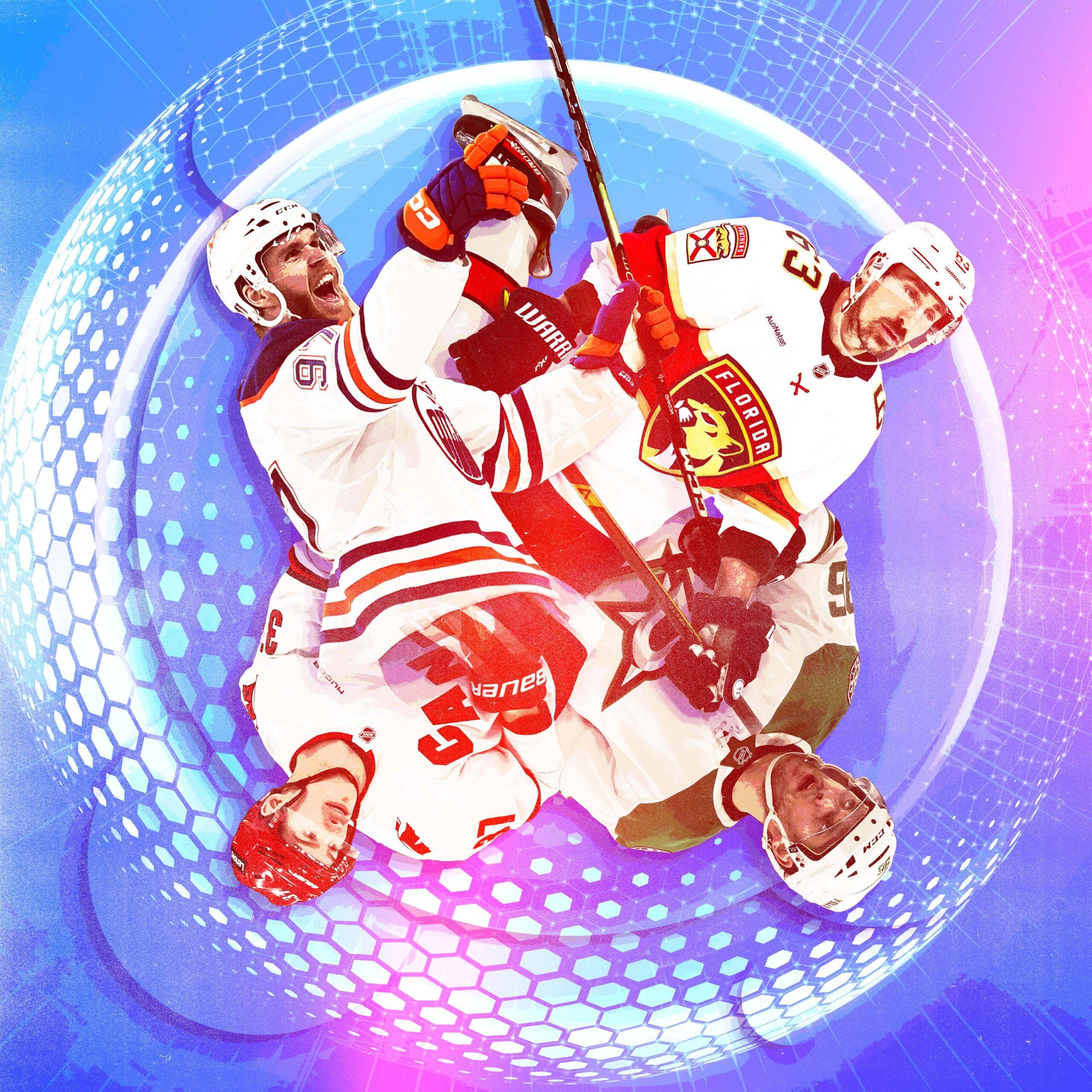
You’d think it would be a more joyous distinction, being one of the final four teams standing in the NHL playoffs. After all, 32 franchises begin each season, each chock-full of guys in the best shapes of their lives, but only half of them will even make it to the playoffs. For those 16 teams that do, the immediate reward is another month’s worth of winnowing chaos and commotion—the fists and insults flying, the goal lamps and skate blades flashing, the legacies and leads unraveling. (Just ask the reliably confounding Toronto Maple Leafs, who’ve now gone 23 straight seasons without a conference final berth.) Only four teams make it past all of that mess—and that’s where the season truly begins.
In the grand scheme of things, getting this far ought to register as a glorious achievement for a hockey team, some real validation, a welcome reminder that this right here is what it’s all about. But unfortunately, also in the grand scheme of things, getting this far mostly just means: Congrats, pal—you’re now halfway there.
This year’s fearsome foursome features the Florida Panthers and Carolina Hurricanes in the Eastern Conference finals and the Dallas Stars and Edmonton Oilers in the West. And while those teams are certainly glad to still be playing, advancing this far is nothing new for them. Florida and Carolina met in the ECF two seasons ago. Dallas-Edmonton is a repeat of last year’s semifinal. It’s possible the same two teams that competed for the Stanley Cup last season—the Panthers and the Oilers—could meet again in a couple of weeks. And it’s not just recent history that’s repeating itself. All four of these franchises have been chipping away at their ultimate goal of winning a Stanley Cup for the better part of a decade, all while trying their best not to damage their own inner cores. (Only last year’s Panthers have succeeded.)
Quick: How many seasons have Tyler Seguin and Jamie Benn been teammates in Dallas? Or how long ago did the Florida Panthers draft Aleksander Barkov to be the foundation of their franchise? If your answer to either question had a single digit, you’re wrong! This June will mark a full decade since Connor McDavid was drafted by the Edmonton Oilers (and 14 years since they selected Ryan Nugent-Hopkins). The Carolina Hurricanes have cycled through many iterations of their roster over the years, but the seeds of their current run were planted back in the old days of 2012, when Captain Jordan Staal joined the squad, and 2014, when the Canes took a chance on an unknown data analyst named Eric Tulsky—now the team’s general manager.
The NHL is said to be a copycat league, and certain fads have risen and fallen over the years: the big possession-hog L.A. Kings teams, the speedy Chicago Blackhawks, the broadly anonymous Vegas Golden Knights. But the real alphas have often emerged by merely playing the long game. The Tampa Bay Lightning lost a Stanley Cup—and then lost, like, all of their dignity—en route to winning a couple of titles in 2020 and 2021. The Colorado Avalanche persisted for years and years before their patience paid off in 2022. The New York Rangers—ugh, dammit. The Florida Panthers slowly but surely turned one corner after another corner and for a while kept finding themselves right up against the same wall until they broke through last season.
All four teams still playing this year have followed this “patience, my child” formula time and again, but so far, only the Panthers have managed to calculate the winning answer. With the semifinals getting underway Tuesday night, here’s a look at who’s still out there doing their best to make everything count. All of these teams have a good idea of what it takes to win a Stanley Cup, which is why none of them seem content merely to have gotten this far. The good news is that when the competitors are this serious, it’s usually a sign that the real fun is only just getting started.
Eastern Conference Finals: Florida Panthers vs. Carolina Hurricanes
The defending Cup champions may have somehow gotten … better? The most devout team in hockey may have managed to grow … even more zealous about its chosen system? It was only two seasons ago that the Panthers swept the Hurricanes in the Eastern Conference finals, but a whole lot has gone down (and a whole lot of weight has been lifted!) since then. The ratty Cats have a title, the curious Canes have conviction, and this series is sure to feature a clash of styles that can’t be cast out as “boring.”
A case for Florida: The Panthers were runners-up in 2023, lifted the Stanley Cup last season, and somehow still have plenty of pep in their step as they now try to win back-to-back titles. They’ve reached this stage thanks to a roster that has only improved, according to their upcoming opponent. “They got better, in my opinion,” Canes coach Rod Brind’Amour observed recently. “They went and picked up two guys that were some of the best players off other teams.” That would be forward Brad Marchand, formerly of the Bruins, and defenseman Seth Jones, of Blue Jackets and Blackhawks fame—two trade deadline acquisitions who played some of their best hockey in the Panthers’ most recent game.
On the road in Toronto for Game 7, Marchand and Jones delivered two goals and three assists in a decisive 6-1 victory. The game left the Leafs organization reeling even more than usual—no small feat—and highlighted Florida’s aggressiveness on and off the ice.
And those are just the newcomers! The Panthers lineup also features a now-veteran cast of proven winners, from Barkov and leading scorer Sam Reinhart to goaltender Sergei Bobrovsky. This is a team that withstood Connor McDavid’s best efforts last spring and the Leafs’ worst desperation last week. Carolina’s neat little diagrammed plays may not stand a chance. The Hurricanes were able to successfully deploy their system against the ailing Devils and aging Capitals, but these Panthers are a different beast.
A case for Carolina: While it’s true that the Canes’ most recent previous Eastern Conference finals appearance was a 0-4 sweep against Florida in 2023, that doesn’t exactly tell the full story of the series. Game 1, for example, went into quadruple overtime, and Game 2 was tied at the end of regulation as well. Games 3 and 4 were both one-goal wins for the Panthers. And the whole series took place without one of the Hurricanes’ young offensive weapons, forward Andrei Svechnikov, who was recovering from a torn ACL.
This postseason, in contrast, Svechnikov has been thriving—and so has the entire Hurricanes system. When deployed successfully, Carolina’s tactic of institutional pestering tends to snuff out opponents’ firepower, but don’t confuse that with passivity: The Canes’ system relies on aggression and forechecking, as opposed to staying back and setting traps. Will Florida be the toughest team they’ve faced yet this postseason? Definitely. But the Panthers are also a little battered after seven games against Toronto and have had little time to rest. Not that the Hurricanes should be taking that for granted. You see, [picks up embroidery sampler], the nice thing about buying into your own system is that you spend less time worrying about everyone else’s logistics, you know?
Key guys to watch: If I were calling the shots, John DeMarsico style, I’d have a little star-cam following both of the guys behind the bench: the profanely erudite Paul Maurice and Rod Brind’Amour, the chiseled former star Maurice once coached. But there are some interesting and pivotal contributors on the rosters, too. Logan Stankoven and Taylor Hall, both midseason newcomers to Carolina, will try to continue to integrate their games into the system. Defenseman Jaccob Slavin will attempt to live up to his play in the second round of the playoffs, during which he was specifically shouted out as underrated by the Washington Capitals coach. “How he’s not in the Norris Trophy conversation every single year, it doesn’t seem right,” Spencer Carbery said. And Svechnikov’s linemates, Sebastian Aho and Seth Jarvis, will focus on eluding Florida defensemen Gustav Forsling and Aaron Ekblad.
Marchand, on the other hand—fresh off yet another schooling of Toronto in a Game 7, not to mention one hell of a postgame interview—seems like a human eraser capable of undoing the Hurricanes’ precious X's and O's. (The same goes for Matthew Tkachuk, who was limited by injury for a chunk of this season.) And if Bobrovsky continues to play the way he did against Toronto, there won’t be a whole lot of writing on the Hurricanes’ side of the scoring ledger at all.
Key forces of nature: As hockey fans know all too well, NHL playoff series are as much about “the intangibles” as they are about the key scorers or the guys behind the bench. And I don’t just mean things like “grit” or “jam” here. I’m talkin’ far more ineffable—even cosmic!—vibes.
This series, for example, pits experience against karma. The Panthers have lifted the Cup/lost the Cup/done the thing/won it all/been there before … and it shows. There aren’t too many hurdles left that this squad hasn’t found a way over or around because once you’ve stared down the barrel of McDavid without blinking, there’s not much that will frighten you.
But the Hurricanes this season have demonstrated that they’re pretty darn good at not blinking, too. By which I mean: Don’t let it be forgot / That Raleigh was a spot / For one brief shining moment / That gave Mikko Rantanen a shot! Earlier this year, the Hurricanes swung for the fences when they pulled off a trade for Rantanen, a 2022 Cup champ and soon-to-be free agent on a Colorado Avalanche team that could no longer afford him. It was a very cool move—until it went about as badly as it could have.
Rantanen, surprised and wounded by the trade, also wasn’t jazzed about his new team’s all-for-one and one-for-all system. The relationship soured almost as soon as it started. And then Carolina GM Eric “The Doctor” Tulsky—mad scientist and former blogger that he is—did something even ballsier than trading for Rantanen: He traded him away to Dallas 42 days later.
I loved this move because it’s so hard to imagine so many other NHL teams making it. In a sport that values resilience and overrates stubbornness, it’s hard to know when to fold—and harder still to do so. A lesser front office might have tried to wring blood from a stone-faced Finn here or banked on some magic happening in the playoffs. But the Hurricanes front office doesn’t believe in magic—just chemistry. They’re running a well-designed experiment here, not genuflecting to the hockey gods. And in some mysterious way, I suspect that’s precisely why the hockey gods might approve.
My hopes and dreams for the winner: I’m choosing to pull for the team whose front office is terminally online over the team whose minority owner is majorly banned from his own arena. (If a Metropolitan Division team is going to contend for the Cup, I guess I’d rather have it happen in the year when the Rangers didn’t wait until the playoffs to implode.) The big question: What is the most exotic animal from Brent Burns’s menagerie that could poop in the Cup? Canes in six.
Oh, and one other thing: Do what Coach tells you. Fuck the plays!
Western Conference Finals: Dallas Stars vs. Edmonton Oilers
The battle of the bridesmaids. The big rematch between so close and yet so far. The 2020 Cup runner-up Dallas Stars versus the 2024 Cup runner-up Edmonton Oilers—two losers that were forced to shake the hands of giddy winners and are now hell-bent on revenge against a cruel world. Not since 2021 has there been a Western Conference finals that didn’t feature one of these franchises. And this spring, both teams are running it all back-to-back, facing off in a rematch of last year’s 4-2 Oilers series win.
A case for Dallas: In addition to the Stars’ 2020 pandemic bubble run to the Cup final, Dallas has now made three straight Western Conference finals—an impressive stretch that will ultimately count for very little if that’s as far as they go. (The Stars are kind of the 49ers of the NHL, though I’m not sure whether I ought to be apologizing to Kyle Shanahan or Peter DeBoer for that comparison.) Sorry, sorry, this was supposed to be the case for the Stars, which so far this postseason can be very roughly boiled down to one part Rantanen, one part goalie Jake Oettinger, and a lot of help from their friends.
Rantanen signed an eight-year, $96 million deal with the Stars upon being dealt to Dallas from Carolina. And the first round of the playoffs pitted him against another of his former franchises, the Avalanche. And how! In Games 4 through 7 of the tight series, Rantanen scored five goals and added six assists. As if that weren’t enough, three of those goals all came in the third period of the Stars’ 4-2 Game 7 win. (Rantanen followed up this performance with a second-period hat trick in Game 1 of the second round against the Winnipeg Jets, a 3-2 Stars win!)
As for Oettinger, well—he’s been way steadier than his counterparts in the Edmonton net, that’s for sure! (What a low bar to clear.) Against the Winnipeg Jets, he easily also outshone a more worthy adversary, Hart Trophy candidate Connor Hellyebuck, to help Dallas return to the WCF.
A case for Edmonton: It’s pretty simple: McJesus. Mister Canada. Captain Pissed Off. And, perhaps most chillingly, Connor the Grouch. Last week, after the Edmonton Oilers dispatched the Vegas Golden Knights in five games, a victorious McDavid stood in the locker room, fuming. He’d just been asked a relatively ho-hum-seeming question about whether he’d noticed his team’s defensive improvement from years past. But McDavid was sick and tired of talking about this subject, the same way he’s been sick and tired of talking about a lot of things (expectations, lost seasons, what went wrong, and even sometimes what went right) for the better part of a decade now.
If you’re the Dallas Stars, seeing McDavid like this must be the scariest environment imaginable, especially when you know firsthand what he’s capable of. Last season, McDavid scored the OT winner over the Stars in Game 1 of the WCF and a key power play goal in the series-clinching Game 6. (In the Cup Final against Florida, he recorded four points in Games 4 and 5 to help power the Oilers back from an 0-3 hole, and for a moment there in Game 7, it seemed like he had the whole universe on his stick.)
But in these playoffs, he hasn’t had to do it alone. Yes, McDavid leads all Oilers scorers with 17 playoff points, but 14 of those came from assists. Five different Oilers have scored more playoff goals this season than McDavid. And defensively, the team’s blue line includes a revitalized John Klingberg as well as top contributor Evan Bouchard, who lit the lamp four times in the first two rounds of the playoffs and added eight assists for good measure.
Key guys to watch: Why, McDavid, of course, and his almost as good counterpart Leon Draisaitl, whose overtime goal sealed a Game 2 win against Vegas in the second round. And McDavid, duh, and also Corey Perry, who has contributed five goals this postseason from the checking line. And McDavid!! And defensemen Darnell Nurse and Brett Kulak, both of whom are averaging more than 20 minutes a game during the ongoing absence of Mattias Ekholm. Did I mention McDavid?!
The Stars have been led thus far by Rantanen’s productive outbursts, but their second line of Benn and Seguin, centered by Matt Duchene, will almost certainly need to make a little more noise if Dallas truly wants to be heard. On the blue line, keep an eye on defenseman Miro Heiskanen, who missed a big chunk of the season with a knee injury and will now have his hands full battling the Oilers offense.
Key forces of nature: This is a contest between the unstoppable forces of having that dawg in oneself and having no trust in one’s goalie, as ever. In other words: This is fundamentally a battle between the Edmonton Oilers … and their own selves. Which isn’t a slight against the Dallas Stars, who stand perfectly positioned to take advantage of their opponent’s internal upheaval. The Stars’ greatest strength remains their organizational depth, whereas the Oilers are just deeply scary: sometimes for their overmatched opponents, and other times for their long-beleaguered fans.
My hopes and dreams for the winner: I appreciate a great many players on both of these teams, wish them all well, and hope they win the series or the title they deserve. That said? If McDavid goes into the 2026 Olympics next February sans Stanley Cup and in this current state of perpetual frustration? I fear “USA Hockey” and possibly even “the United States of America” will wind up becoming Canada’s 11th province. Let’s get this man the silver trophy—and the silver medal—he so richly deserves. I want to see what his happy face looks like. Oilers in six.
Oh, and one other thing: This is your captain speaking. Dig the fuck in!

